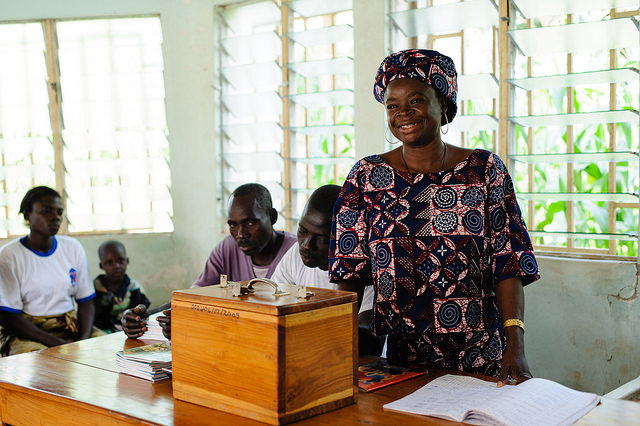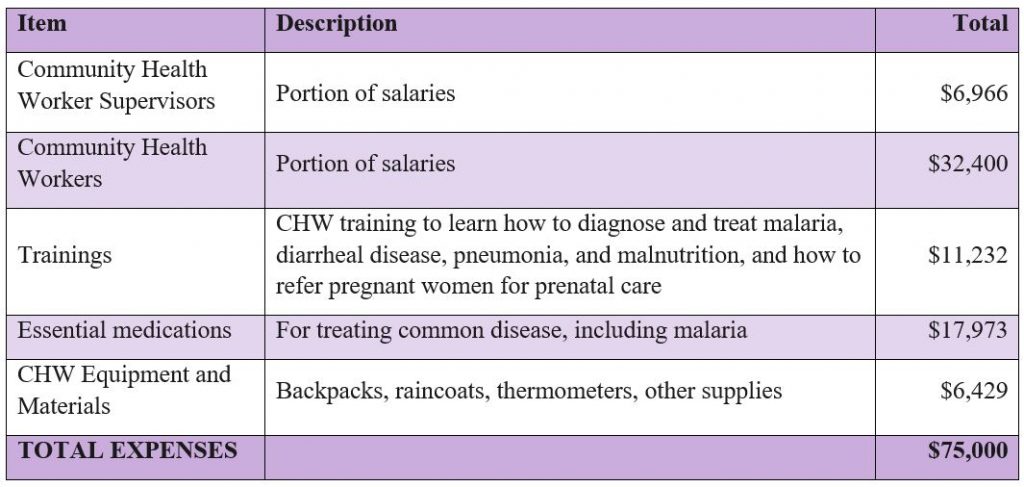
Project Title: Empowering Female Community Health Workers to Provide Integrated Primary Care in Remote Communities in Northern Togo, West Africa
Location: Kara Region, Northern Togo, West Africa
Project Summary: Since its inception in 2004, Integrate Health (formerly Hope Through Health) has excelled in fulfilling its mission of ending preventable deaths in isolated, forgotten rural communities of Togo where poverty is persistent. Over the years, Integrate Health systematically worked to reduce geographic barriers and high costs of care, lack of supplies and equipment, and the low utilization of healthcare. The Ministry of Health in Togo has acknowledged and recognized Integrate Health’s efforts for its excellence in providing health care and, today, they work side-by-side to reach isolated communities.
Integrate Health received a DFW Featured Grant in 2015. It surpassed its goals and objectives to employ, train, and deploy 26 Community Health Workers to provide maternal and child healthcare services. Access, timeliness, and quality of care was vastly improved. More importantly, Integrate Health collaborated with an international community of health practitioners, thought leaders, and policy makers to inform best practice, strengthen primary healthcare, and advance universal health coverage which was summarized in a well-regarded report: Practitioner Expertise to Optimize Community Health Systems.
For this Sustained Grant from DFW, Integrate Health will replicate the impact observed in the Empowering Female CHWs to Provide Integrated Primary Care to Neglected Communities Pilot in new communities in order to empower more female CHWs to save an even greater number of lives. Over the next three years, Integrate Health will recruit, train, and equip 75 new individuals to serve as CHWs in their communities. Empowered with the necessary skills and resources, motivated CHWs, who may have never had a chance to complete formal education, will provide home-based care and referrals to 17,250 pregnant women and children under five in the Kozah, Bassar, Dankpen, Binah, and Keran Districts of northern Togo.
Impact: This project will have a direct impact on 17,250 women and children, and will indirectly impact 58,999 members of the community.

Why we love this project: We love this project’s focus on building and strengthening the health care infrastructure in poor rural communities. By selecting women from these communities to train, educate, and be deployed as Community Healthcare Workers, Integrate Health elevates these women to respected positions of leadership and influence in their communities. By focusing on services for vulnerable women and children, Integrate Health is ensuring the long-term health and well-being of these communities.
Sustainable Development Goals:
![]()
![]()
2015 Featured Grant Info
Project Title: Empowering Female Community Health Workers (CHWs) to Provide Maternal and Child Healthcare in Northern Togo, West Africa
Location: Togo
Grant Amount: $50,000
Grantee Website: integratehealth.org/
Areas of Impact: Health
Mission of Integrate Health (formerly Hope Through Health): Featured (2015), Sustained (2019-2021)
Hope Through Health believes that everyone deserves access to high quality healthcare regardless of the latitude and longitude of their birthplace. We deliver effective, efficient, community-based healthcare in neglected settings like Togo, West Africa.
Summary
The grant will empower 25 female Community Health Workers (CHWs) to provide maternal and child healthcare to 3,500 pregnant women and children under 5 in the Kozah District of northern Togo, leading to reduced rates of maternal and child morbidity and mortality.
The project aims to increase access to, timeliness of and quality of healthcare services for pregnant women and children under 5 in the Kozah District of Togo. This will lead to decreased rates of maternal and child morbidity and mortality over the long-term.
DFW funding will support:
Personnel costs will include the full-time salaries of the new hires, including the Community Health Worker Supervisor and the 25 new CHWs, who will provide home-based care to women and children. Training costs include a per diem to cover food and lodging for training participants and the costs of printing and duplicating of training materials. CHW materials include bags, raincoats, and sharps containers, among other supplies. The motorcycle, gasoline and motorcycle maintenance will allow the CHW Supervisor to support and supervise CHWs in the field. Monitoring, evaluation and quality improvement materials will allow for data collection and communication among CHWs, the CHW supervisor and public health center staff.
Why We Love This
We love the focus on reducing maternal and child mortality and morbidity. The focus on mothers and the inclusion of HIV screening and treatment in this community is good.
Location Map
